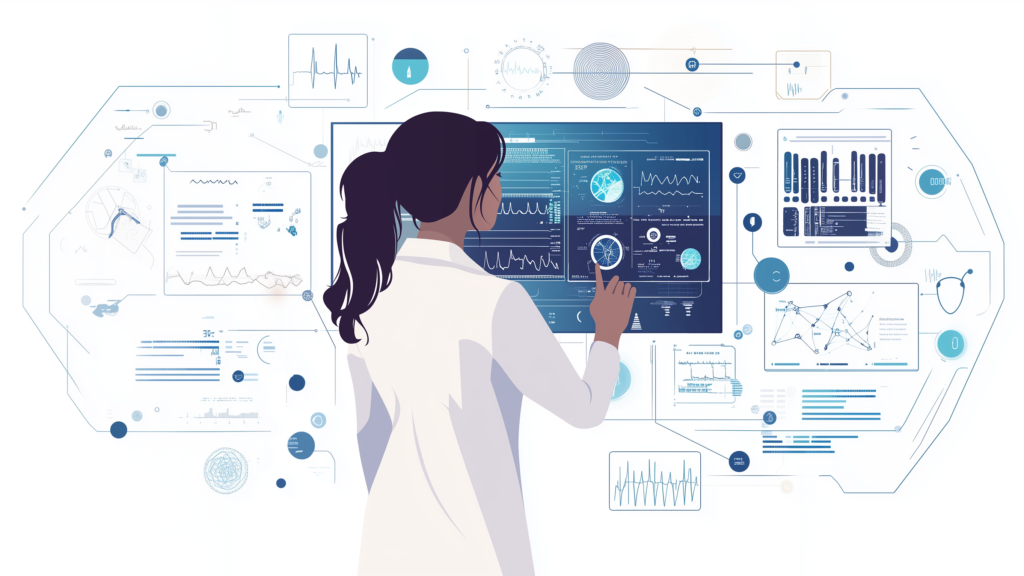
Healthcare technology has always been a catalyst for transformation. The integration of Artificial Intelligence (AI) into Electronic Health Record (EHR) systems stands as a brilliant example, holding the potential to revolutionize patient care, health information management, and healthcare operations.
As the healthcare landscape evolves, AI-enhanced EHRs are no longer a futuristic concept but a present-day reality. These advanced systems promise to address long-standing challenges, streamline processes, and unlock new possibilities in healthcare delivery.
However, the path to implementing such sophisticated technology is not without its hurdles. Many healthcare organizations find themselves grappling with questions about the practicality, effectiveness, and return on investment of AI in EHRs. These are valid concerns, and they underscore the importance of approaching AI integration with a strategic, well-informed plan. The key lies not just in adopting new technology, but in optimizing it to meet the unique needs of each healthcare organization.
Check out this Deep Dive into this article.
The AI Revolution in Healthcare: More Than Just Buzz
When we talk about AI in healthcare, we’re not discussing some far-off future scenario. This technology is already making huge waves in the industry, offering tangible benefits that address many of the daily challenges faced by healthcare organizations. Imagine an EHR system that doesn’t just store data but actively helps make better decisions, reduce administrative burden, and improve patient outcomes.
For instance, AI-powered predictive analytics can forecast patient risks and outcomes, allowing for proactive interventions. Natural language processing can sift through clinical notes, extracting meaningful data that might otherwise be overlooked. Clinical decision support systems, enhanced by AI, can provide real-time assistance to healthcare providers, ensuring more informed decision-making at the point of care.
AI is also transforming the administrative side of healthcare. Automated coding and billing processes can significantly improve revenue cycle management, while voice recognition and dictation tools make documentation faster and more accurate. These advancements translate to real-world efficiency gains, allowing staff to focus more on what truly matters: patient care.
Addressing the Elephant in the Room: EHR Pain Points
Let’s face it — EHRs, for all their benefits, have also been a source of frustration for many healthcare professionals. The good news is that AI has the potential to alleviate many of these long-standing issues:
- Information overload? AI can sift through vast amounts of data, presenting only the most relevant information when and where it’s needed.
- Drowning in documentation? Natural language processing and voice recognition technologies can streamline the process, freeing up more time for patient interaction.
- Alert fatigue wearing you down? Machine learning algorithms can refine clinical alerts, ensuring only the most critical and relevant notifications are received.
- Interoperability giving you headaches? AI can assist in standardizing and mapping data across different systems, facilitating smoother information exchange.
- Billing complexities slowing you down? AI-powered systems can improve coding accuracy, reduce claim denials, and accelerate reimbursement cycles.
By addressing these pain points, AI makes the entire system more intuitive, efficient, and aligned with your workflow.
The Realities of Implementation: Challenges and Solutions
Implementing AI features into your EHR system isn’t without its challenges. Integration can be complex, requiring specialized knowledge and careful planning. User adoption might require significant training efforts. And of course, there are always regulatory compliance considerations, particularly when it comes to protecting sensitive patient information.
The ethical implications of using AI in healthcare decision-making can’t be overlooked. Ensuring data quality, addressing potential biases, and maintaining transparency in AI-driven processes are crucial aspects that need careful consideration.
But these challenges aren’t insurmountable. With the right approach and expertise, they can be effectively managed, allowing you to reap the full benefits of AI-enhanced EHRs.
The Power of Optimization: Tailoring AI to Your Needs
This is where EHR optimization comes into play. It’s all about having the right AI features, perfectly tailored to your organization’s unique needs and workflows. Optimization involves:
- Customizing AI capabilities to align with your specific objectives
- Seamlessly integrating new features into existing workflows
- Continuously refining algorithms to ensure accuracy and relevance
- Developing governance structures to oversee the ethical use of AI
When done right, optimization ensures that AI becomes an invaluable asset that drives tangible improvements in patient care and operational efficiency.
Why Xpio Health? Because Experience Matters
At Xpio Health, we understand the complexities faced by behavioral health organizations. Since 2010, we’ve been at the forefront of healthcare technology, specializing in EHR selection, implementation, and optimization. Our team brings a wealth of expertise in data visualization, performance management, cybersecurity, and HIPAA compliance—all crucial elements in today’s AI-driven healthcare landscape.
But what truly sets us apart is our approach. We believe in creativity, communication, and problem-solving. We’re not here to sell you a one-size-fits-all solution. Instead, we work collaboratively with you, applying our expertise to find the right mix of technology, people, and processes that address your specific challenges.
Ready to explore how AI can transform your EHR system and your healthcare delivery? Contact Xpio Health today for a consultation. Together, we can navigate the future of healthcare technology, turning challenges into opportunities and data into insights that truly matter.
#AIinHealthcare #EHROptimization #ArtificialIntelligence #HealthcareTechnology #PeopleFirst #HealthcareInnovation #XpioHealth




